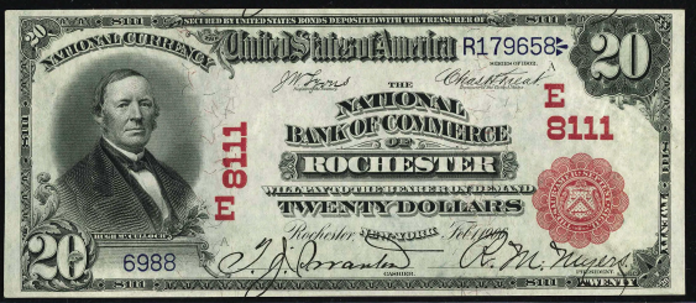Twenty Dollar Notes › Nationals › 1902 Twenty Dollar National Bank Notes › Washington Charters › 1902 $20 Dayton Washington National Bank Of Dayton
Get Value Now
| Item | Info |
|---|---|
| Series | 1902 |
| Charter | #3799 National Bank of Dayton of Dayton, Washington |
| Year Chartered | 1887, 220 Banks Chartered |
| City Info | Dayton is a city in and the county seat of Columbia County, Washington, United States. The population was 2,526 at the 2010 census. Dayton was founded in the 1860s. A town site plat was filed by Jesse N. and Elizabeth Day on November 23, 1871. Dayton was officially incorporated on November 10, 1881 and was named for Jesse Day. Dayton has the oldest train depot in Washington State and the oldest continuously used courthouse. The historical community of Baileysburg was once located about one mile southeast of Dayton, at the junction of North Touchet and South Touchet Roads. Source: Wikipedia |
| Similar Cities | 19 banks with similar city. First 12 below: 1. Dayton, Ohio - First National Bank 2. Dayton, Ohio - Second National Bank 3. Dayton, Ohio - Dayton National Bank 4. Dayton, Ohio - Merchants' National Bank 5. Dayton, Washington - First National Bank 6. Dayton, Ohio - Winters National Bank 7. Dayton, Ohio - Third National Bank 8. Dayton, Washington - Columbia National Bank 9. Dayton, Ohio - City National Bank 10. Dayton, Ohio - Fourth National Bank 11. Dayton, Ohio - American National Bank 12. Dayton, Tennessee - First National Bank |
| Seal Varieties | Red, Blue |
| See Also | If your note doesn't match try: 1. 1905 $20 Gold Certificate 2. 1906 $20 Gold Certificate |
| Other Info | 1. Value depends on notes known for charter, condition and market demand. |
| Neat Fact | Notes from common charters are less valuable compared to rarer charters. Value also depends on type, denomination and total notes known for city, state and region. Ultimate determination of value is collector demand. |
No Obligations Offers and Appraisals
Please submit a good photo or scan. It will be identified and evaluated. Understand there may be subtle differences between the image you see above and your note. Signatures, design, markings and note condition will determine the offer price. Notes in Uncirculated or better condition receive the best offers.
Appraisals can be estimated for wholesale and retail prices. Wholesale is what dealers typically pay. Retail is what a collector might pay. Retail is slightly higher in most cases.
Please visit this page for USA Paper Money Reference. Do not treat this page as a reference guide, it is for appraisal and acquisition purposes only.
